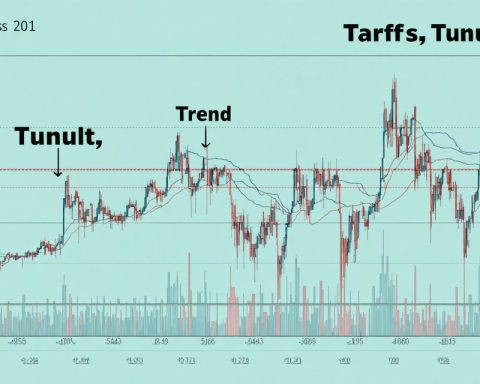The world of retail is undergoing a rapid transformation, and StrongPoint is at the forefront of this change. By integrating advanced cash handling capabilities, Rimi Baltic aims to simplify the shopping experience. Zane Ermansone, the Digital Development Director at Rimi Baltic, emphasizes their commitment to providing efficient and accessible checkout solutions to meet the diverse needs of consumers.
In several European markets, including the UK, Sweden, and Norway, older self-checkout technologies still prevail. Jacob Tveraabak, CEO at StrongPoint, highlights the contrast, pointing out how Baltic countries are leading with the adoption of StrongPoint’s next-generation solutions. This technology not only accelerates the self-checkout process but also significantly enhances the overall customer experience.
The anticipation surrounding these advancements is echoed by the accolades received at the 2024 RTIH Innovation Awards. Taking place at Central London’s historic 66 Portland Place, the event honored global pioneers in retail technology. Celebrating its sixth year, the annual event has evolved remarkably from its humble beginnings during the pandemic, as highlighted by Scott Thompson, Founder and Editor of RTIH.
The awards night, hosted by comedian Lucy Porter, featured lively discussions about innovations such as checkout-free stores and automated supply chains. These innovations not only promise to redefine customer interactions but also enhance operational efficiency, driving profitability across the retail sector. As the awards culminate, the spotlight is on StrongPoint and other trailblazers, whose cutting-edge solutions are set to reshape the future of retail.
The Silent Revolution: How Advanced Cash Handling is Transforming Everyday Shopping
The bustling world of retail is not just about grabbing items off shelves and heading to the checkout. Behind the scenes, a quiet revolution is taking place, with advanced cash handling technologies leading the charge. While the Baltic states—like Lithuania, Latvia, and Estonia—are currently spearheading this transformative change, the ripple effects are expected to impact societies across the globe.
Shaping Daily Life and Communities
As digital advancements in retail take center stage, the implications for consumers and communities are profound. Advanced cash handling systems, such as those pioneered by companies like StrongPoint, not only streamline the shopping process but significantly enhance security and accuracy. With robust systems managing cash transactions, instances of human error and theft are drastically reduced, creating a safer, more reliable retail environment. This shift also encourages an increase in consumer trust, as shoppers feel more secure in their transactions.
Beyond mere convenience, these innovations can have economic implications for communities. For instance, local businesses that adopt these cutting-edge solutions may find themselves more competitive, drawing in consumers who are attracted to modern and efficient service. Moreover, job roles in retail may evolve to focus more on customer interaction and less on manual labor tasks, potentially improving job satisfaction for employees.
Interesting Facts and Controversies
While some hail advanced cash handling systems as miraculous, others question what is being lost in the transition. One intriguing concern is about the human element in retail. With the growing reliance on technology, does the traditional, personable shopping experience slip through our fingers? Critics argue that the charm of browsing stores and interacting with human cashiers might diminish, impacting consumer engagement and loyalty.
Furthermore, there’s the debate on data privacy. As these systems gather massive amounts of transaction data, privacy advocates worry about how consumer information is handled and who has access to this data. Are retailers conducting adequate security measures to protect their customers’ information from potential breaches? These are critical questions that must be addressed as the industry leans more heavily on tech-based solutions.
Advantages and Disadvantages
On the plus side, advanced cash handling technology enhances the speed, efficiency, and accuracy of checkouts—a boon for both stores and shoppers. For retailers, it means reduced overhead costs and increased throughput; for consumers, it implies shorter wait times and a seamless transaction experience.
Conversely, such rapid adoption presents logistical challenges. The cost of upgrading to cutting-edge technology can be steep, particularly for smaller businesses with limited capital. Additionally, the initial learning curve can intimidate both employees and customers accustomed to conventional systems, possibly resulting in temporary disruption and dissatisfaction.
Key Questions and Answers
Q: Why are certain regions, like the Baltic states, ahead in adopting advanced retail technologies?
A: The Baltic states often embrace digital innovation due to supportive governmental policies, high internet penetration rates, and a population open to technological experimentation. Their status as agile and dynamic markets makes them ideal test beds for new retail innovations.
Q: Could this technology lead to unemployment in the retail sector?
A: While there’s potential for job displacement, it can also lead to job transformation. As routine tasks become automated, employees can shift focus to customer service roles, emphasizing skills that machines cannot replicate.
For those eager to delve deeper into the evolving retail landscape, reliable sources such as Retail Dive and Retail Week offer comprehensive industry insights.
In conclusion, while the shift towards advanced cash handling brings substantial benefits, it also incites crucial debates about the future of retail jobs, consumer privacy, and maintaining the delicate balance between technology and human touch. As more retailers embrace these technologies, how societies choose to navigate these challenges will determine the true impact of this retail revolution.



















